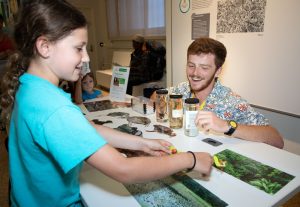Contents
Message from the Chair
David Blackburn, chair.dpcb@sicb.org
Thanks to all that participated in the virtual SICB 2021 meeting. We had an excellent competition for the David and Marvalee Wake Award competition for best student presentations. Please join me in congratulating our winners, Jack Boyette for best talk and Tony Lapsanksy for best poster! Thank you to all of the participants for their high-quality presentations.
This is my final year as SICB DPCB Chair, which followed a term as the DPCB Secretary. Thinking about the future of the division, I am pleased by the excellent group of scientists and students that have recently and continue to engage with DPCB. Over the past few years, DPCB began the Ask-an-Expert booth, which have been well received even while completely virtual in 2021! We have seen more and more involvement in the Wake Award competition with each year, culminating in 18 submissions for the 2021 best talk competition. DPCB added a new divisional editor for Integrative and Comparative Biology, Dr. Hannah Wood of the National Museum of Natural History. And we have seen a good number of papers from DPCB members in the new Integrative Organismal Biology.
With many changes in our divisional leadership happening over the coming year, we will have new challenges to tackle. We will continue to find ways to engage divisions across SICB as well as other societies focused on ecology and evolution. We also must further engage and support a broader community of scientists and students of many identities, especially Black, indigenous, and other people of color. A greater diversity of voices is critical not only to tackling the scientific questions that fascinate all of us, but also in growing the ranks of mentors that can support students and early career scientists of all identities.
I want to extend a special note of thanks to our division Secretary, Dr. Haley O’Brien. I have really appreciated her enthusiasm and dedication to the division, especially bringing the yearly Ask-an-Expert booth to fruition.
Welcome to Dr. Leigha Lynch who is now our new division Program Officer.
Next year will also bring both a new division Chair (Dr. Samantha Price) and new division Secretary (Dr. Ryan Felice). The future of the Division of Phylogenetic and Comparative Biology is bright.
Join Us in Welcoming Our New Officers!
From DPCB Chair-Elect, Samantha Price:
I am excited to be chair-elect for the Division of Phylogenetic and Comparative Biology. I will work to grow our small but mighty division by building upon the amazing efforts by Haley O’Brien and the “Ask an Expert Booth” that she pioneered, to make us indispensable to our members and the broader SICB community! My personal priorities are to lead efforts to support our Early Career Researchers, especially those marginalized by systemic biases inherent within our institutions, and to build strong connections with other SICB divisions, potentially through joint symposia and workshops. If you are a grad student or postdoc and have workshop/symposia ideas but would like some support developing a proposal I encourage you to reach out to me or any of our DPCB committee and we will glad to help and provide advice. I would also love to hear your priorities for DPCB; what can we be doing to better support you? If you have ideas and suggestions please share them with me.
From DPCB Program Officer, Leigha Lynch:
I am very excited to take on the role of Program Officer for DPCB this year and thank Todd Oakley for paving the way. I’m looking forward to seeing the many fascinating symposia proposals for SICB 2022 and aim to support those that focus on understanding the evolution of taxa and their associated traits. In particular, I aim to support those using phylogenetic and phylogenetic comparative methods and those that are promoting novel approaches within these fields.
From DPCB Secretary-Elect, Ryan Felice:
I am thrilled to be serving as the secretary-elect this year and learning the ropes from our current secretary Haley O’Brien. I have loved participating in the Ask-an-Expert Booth over the last few years and I’m excited to help keep the booth going strong. I can’t wait to bring you the latest and greatest DPCB events and announcements in our newsletter.
DPCB Student and Postdoctoral Updates & Opportunities
Emily Lessner, Divisional SPDAC Representative
This year, SPDAC adapted to the online format smoothly. In place of the first-timer orientation we had a first-timer video up on the welcome page that received nice feedback. Our annual workshop covered transferable skills in academia and non-academia. It featured short panel discussion followed by breakout rooms and was well attended. We had a booth in the exhibitor hall that had links to our brochures and posters covering a variety of topics. Along with the booth, each division representative held a virtual office hour, and though these were not attended, we feel being available was still important. There was also a well-attended SPDAC / Royal Society publishing workshop covering all aspects of publication.
Next year we are adding a brochure on mental health, online resources, and coping. We’d like to increase booth traffic, involvement, and knowledge of SPDAC’s role, so at the booth we plan to host SICB members of interest to facilitate discussions that junior SICB members might have trouble initiating alone. Also, we plan to have short skill demos on a variety of topics (editing 3D graphics, yoga, science communication, interview strategies, figure making, etc.). Our workshop plans for next year will center around science communication with subtopics including storytelling, art, accessibility, open software, and more.
David and Marvalee Wake Awards for Best Student Presentations
Haley O’Brien, secretary.dpcb@sicb.org
Each year that I have been an officer for this division, the Wake Awards have become increasingly competitive and continue to showcase some of the best of early career systematics, genomics, and phylogenetic comparative methods. My sincere thanks to the judges who generously volunteer their time to evaluate talks and posters – the student competitors are making the job difficult!
Congratulations to this year’s presenters for making it through a competitive selection process, and to our winners for their outstanding research and presentation skills!
Winner of the Wake Award for Best Student Oral Presentation, Jack Boyette

My frog non-visual opsin research began in the summer of 2019 as part of an REU at the Smithsonian’s National Museum of Natural History under the mentorship of Dr. Rayna Bell and Dr. Ryan Schott. I continued to work on the project remotely while finishing my undergraduate degree at Berry College, which I completed in May 2020. My most immediate goals are admission into a PhD program (still waiting to hear back from programs – so fingers crossed!) and completing a northbound thru-hike of the Appalachian Trail, which I will begin in March 2021. As a prospective PhD student, I am broadly interested in investigating genetic and ecological underpinnings of differential disease outcomes in frogs; and as a prospective thru-hiker, I aim to hike from Georgia to Maine in five months.

Honorable Mention: Erik Iverson, Ph.D. Student at U.T. Austin, for his work on positive selection on mitochondrial genes in high-elevation species
Winner of the Wake Award for Best Student Poster Presentation, Tony Lapsansky

I am a 5th year graduate student in the Department of Ecology and Evolution at the University of Montana. My doctoral research focuses on how birds evolved to accomplish locomotion in both air and water, from the perspective of muscle contractile dynamics, kinematics, fluid dynamics, and morphometrics. My goal for the future is to become a professor of biology at an R1 university. I hope to combine techniques from biomechanics, evolutionary biology, and sensory neuroscience to understand how animals move through the world in a comparative context.
Many thanks our student presenters! If you are a student researching systematic and phylogenetic comparative biology, submit your abstract to be considered for next year’s Wake Award session in 2022! We welcome all research focusing on trees – how to make them and how to use them for comparative analysis!
Workshop Opportunity
The Evolutionary Quantitative Genetics Workshop for 2021, sponsored by Friday Harbor Laboratories of the University of Washington, will occur online this year, from July 12-16. The Workshop is led by Stevan Arnold and Joe Felsenstein, with 6 other lecturers. It will involve lectures, discussion, and computer lab exercises.
A link to the application form can be found here. The workshop will review the basics of evolutionary genetics of quantitative characters and its connection to evolution observed at various time scales. An aim of the workshop is to build a bridge between the traditionally separate disciplines of quantitative genetics and comparative methods. It is intended for graduate students, postdocs, and junior faculty. There is a cost of $105, payable by those who are accepted.
Diversity and Inclusion
As the DPCB Executive Committee reflects on recent years and the turbulent events that marked the beginning of 2021 in the United States, we recognize that equity, equality, and bias must be thoughtfully examined in our personal, political, community, and professional lives. As a division in an international scientific society, we have a duty to do better for all of our members. Our role is to provide a safe, productive venue for sharing new ideas, building collaborations, and celebrating the accomplishments of students and early career members. Scientific societies are crucial to career-building and job security; therefore, bias in our personal viewpoints and the structure of our activities is harmful. We fail to achieve our mission if we do not work to ensure that these benefits extend to all of our members; if we do not identify concrete steps to foster inclusivity in our division or amplify the voices and talents of members from underrepresented groups.
Three years ago, we started the Ask-An-Expert Booth––currently our most visible SICB event––with a goal of providing supportive, one-on-one assistance beyond fast-paced workshops. Behind the scenes, a primary goal has been highlighting the stellar work being done in phylogenetics, comparative methods, and data analysis by women and minorities. SICB members, especially those just beginning their research careers, should be able to see someone they can relate to under a banner that says “Expert.” We have succeeded in promoting early career women, but we need to improve recruitment of Experts with respect to race, sexual orientation, and disability status.
As the Executive Committee for DPCB, we acknowledge that we can and must do better. We will begin by working with SICB leadership and the Broadening Participation Committee to survey demographic data of our members and to better recruit Experts. We pledge to take concrete steps to build a more diverse division, and welcome any ideas and feedback our members may have.
